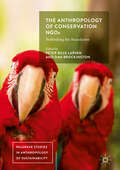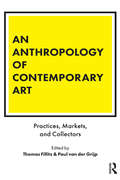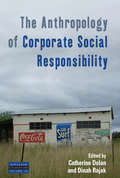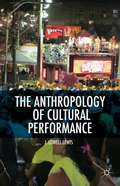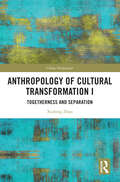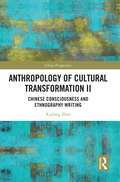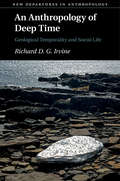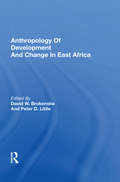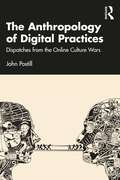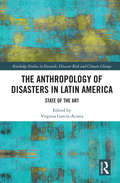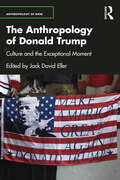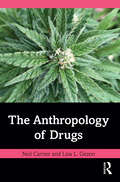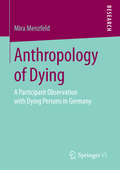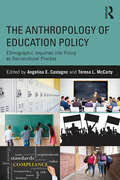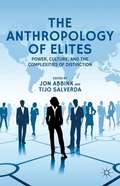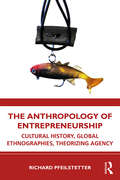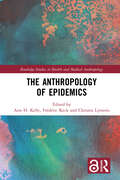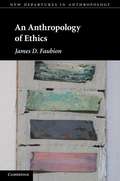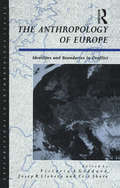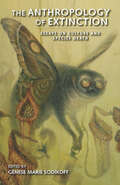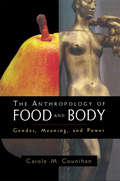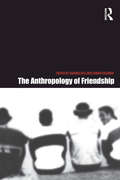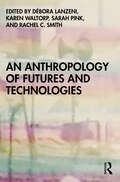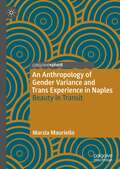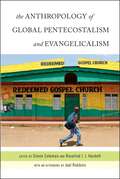- Table View
- List View
The Anthropology of Conservation NGOs
by Dan Brockington Peter Bille LarsenThis book explores how NGOs have been influential in shaping global biodiversity, conservation policy, and practice. It encapsulates a growing body of literature that has questioned the mandates, roles, and effectiveness of these organizations-and the critique of these critics. This volume seeks to nurture an open conversation about contemporary NGO practices through analysis and engagement.
An Anthropology of Contemporary Art: Practices, Markets, and Collectors (Criminal Practice Ser.)
by Thomas Fillitz Paul van der GrijpDrawing on the exciting developments that have occurred in the anthropology of art over the last twenty years, this study uses ethnographic methods to explore shifts in the art market and global contemporary art. Recognizing that the huge diversity of global phenomena requires research on the ground, An Anthropology of Contemporary Art examines the local art markets, biennials, networks of collectors, curators, artists, patrons, auction houses, and museums that constitute the global art world.Divided into four parts – Picture and Medium; World Art Studies and Global Art; Art Markets, Maecenas and Collectors; Participatory Art and Collaboration – chapters go beyond the standard emphasis on Europe and North America to present first-hand fieldwork from a wide range of areas, including Brazil, Turkey, and Asia and the Pacific.With contributions from distinguished anthropologists such as Philippe Descola and Roger Sansi Roca, this book provides a fresh approach to key topics in the discipline. A model for demonstrating how contemporary art can be studied ethnographically, this is a vital read for students in anthropology of art, visual anthropology, visual culture, and related fields.
The Anthropology of Corporate Social Responsibility
by Dinah Rajak Catherine DolanThe Anthropology of Corporate Social Responsibility explores the meanings, practices, and impact of corporate social and environmental responsibility across a range of transnational corporations and geographical locations (Bangladesh, Cameroon, Chile, the Democratic Republic of the Congo, Ghana, India, Peru, South Africa, the UK, and the USA). The contributors examine the expectations, frictions and contradictions the CSR movement is generating and addressing key issues such as the introduction of new forms of management, control, and discipline through ethical and environmental governance or the extent to which corporate responsibility challenges existing patterns of inequality rather than generating new geographies of inclusion and exclusion.
The Anthropology of Cultural Performance
by J. Lowell LewisContemporary life in most nation-states is not truly cultural, but rather "culture-like," especially in large-scale societies. Beginning with a distinction between special events and everyday life, Lewis examines fundamental events including play, ritual, work, and carnival and connects personal embodied habits and large-scale cultural practices.
Anthropology of Cultural Transformation I: Togetherness and Separation (China Perspectives)
by Xudong ZhaoAs the first of a two-volume set on the anthropology of cultural transformation, this book discusses the manifestations of cultural transformation in the modern world and explores the re-establishment of cultural consciousness. Anthropology in the twenty-first century is confronted with a worldview of cultural transformation based on communication, collision, and interaction among cultures around the globe. This two-volume set aims to reorient the role and function of anthropology by focusing on the reconstruction of knowledge and cultural consciousness in order to better imagine and realize the synergetic interaction between different cultures and civilizations. In this first volume, the author first provides an overview of the key issues and stances of anthropology in the face of cultural transformation. The book examines the trend of social and cultural transformation in the modern world and in China. It analyzes how the technology of separation brought about by modernity shapes family function and education. As a promising solution to this predicament, the book elucidates the importance of cultural consciousness in resisting disasters and social syndromes. The title will appeal to anthropologists, students, and general readers interested in anthropology, sociology, and ethnography.
Anthropology of Cultural Transformation II: Chinese Consciousness and Ethnography Writing (ISSN)
by Xudong ZhaoThis book is the second of a two-volume set on the anthropology of cultural transformation. It examines how cultural consciousness enriches and reshapes the vision of anthropology and ethnographic writing.Anthropology in the twenty-first century is confronted with a worldview of cultural transformation based on communication, collision, and interaction among cultures around the globe. This two-volume set aims to reorient the role and function of anthropology by focusing on reconstructing knowledge and cultural consciousness to better imagine and realize the synergetic interaction between different cultures and civilizations. The second volume begins with a case study of the demolition of urban areas in Beijing, revealing a reinvention of public cultural representation. It then explores the new paths and missions of Chinese anthropological studies and ethnographic writing, which should be grounded in China's indigenous consciousness and cultural reservoir.The title will appeal to anthropologists, students, and general readers interested in anthropology, sociology, and ethnography.
An Anthropology of Deep Time: Geological Temporality and Social Life (New Departures in Anthropology)
by Richard D. IrvineIn the face of debates about the Anthropocene - a geological epoch of our own making - and contemporary concerns about ecological crisis and the Sixth Mass Extinction, it is more important than ever to locate the timeframe of human activity within the deep time of planetary history. This path-breaking book is a timely critical review of the anthropology of time, exploring our human relationship with the timescale of geological formation. Richard D. G. Irvine shows how the time-horizons of social life are a matter of crucial concern, and lays bare the ways in which human activity becomes severed from the long-term geological and ecological rhythms on which it depends.
Anthropology Of Development And Change In East Africa
by Peter D. Little David W. BrokenshaThe editors are grateful for the editing and production assistance of a number of IDA staff members, especially Sylvia Horowitz, who copyedited the entire manuscript and supervised its transformation for computer-generated typesetting. Vivian Carlip gave a second editorial reading, Cecily O'Neil helped with production, the manuscript was proofread by Vera Beers-Tyler, and Peter Daly designed the map on the following page. To the contributors, of course, goes our greatest appreciation, for their gracious cooperation in making requested revisions as well as for the content of their work.
The Anthropology of Digital Practices: Dispatches from the Online Culture Wars
by John PostillThe Anthropology of Digital Practices connects for the first time three distinct research areas – digital ethnography, causal ethnography, and media practice theory – to explore how we might track the effects of new media practices in a digital world. It invites media and communication students and scholars to overcome the field’s old aversion to ‘media effects’ and explores the messy, complex, open-ended effects of new media practices in a digital age.Based on long-term ethnographic research and drawing from recent advances in the study of causality and ethnography, this book tells the ‘formation story’ of the anti-woke movement through a series of critical media events. It argues that digital media practices (e.g. podcasting, YouTubing, tweeting, commenting, broadcasting) will have ‘formative’ effects on an emerging social world at different points in time. One important task of the digital ethnographer is precisely to distinguish between the formative and non-formative effects of specific media practices. This book makes three contributions to our understanding of media practices in the digital era, namely a theoretical, methodological, and empirical contribution. Theoretically, it furthers the ‘practice turn’ in media and communication studies by engaging with the latest thinking on causality and ethnography. Methodologically, it serves as a compelling, up-to-date guide to doing digital ethnography, with special reference to the study of digitally mediated practices. Empirically, it is the first book-length study of the anti-woke movement, a major actor in the ‘culture wars’ currently being fought across the Western world.With its accessible language and rich case studies, The Anthropology of Digital Practices will make an ideal supplementary textbook for a range of undergraduate and graduate courses in research methods, digital ethnography/anthropology, and digital activism.
The Anthropology of Disasters in Latin America: State of the Art (Routledge Studies in Hazards, Disaster Risk and Climate Change)
by Virginia Garcia-AcostaThis book offers anthropological insights into disasters in Latin America. It fills a gap in the literature by bringing together national and regional perspectives in the study of disasters. The book essentially explores the emergence and development of anthropological studies of disasters. It adopts a methodological approach based on ethnography, participant observation, and field research to assess the social and historical constructions of disasters and how these are perceived by people of a certain region. This regional perspective helps assess long-term dynamics, regional capacities, and regional-global interactions on disaster sites. With chapters written by prominent Latin American anthropologists, this book also considers the role of the state and other nongovernmental organizations in managing disasters and the specific conditions of each country, relative to a greater or lesser incidence of disastrous events. Globalizing the existing literature on disasters with a focus on Latin America, this book offers multidisciplinary insights that will be of interest to academics and students of geography, anthropology, sociology, and political science.
The Anthropology of Donald Trump: Culture and the Exceptional Moment (Anthropology of Now)
by Jack David EllerThe Anthropology of Donald Trump is an edited volume of original anthropological essays, composed by some of the leading figures in the discipline. It applies their concepts, perspectives, and methods to a sustained and diverse understanding Trump’s supporters, policies, and performance in office. The volume includes ethnographic case studies of ‘Trump country’, examines Trump’s actions in office, and moves beyond Trump as an individual political figure to consider larger structural and institutional issues. Providing a unique and valuable perspective on the Trump phenomenon, it will be of interest to anthropologists and other social scientists concerned with contemporary American society and politics as well as suitable reading for students and researchers in anthropology and politics, and for courses on political anthropology and U.S. culture.
The Anthropology of Drugs
by Neil Carrier Lisa L. GezonFrom khat to kava to ketamine, drugs are constitutive parts of cultures, identities, economies and livelihoods. This much-needed book is a clear introduction to the anthropology of drugs, providing a cutting-edge and accessible overview of the topic. The authors examine and assess the following key topics: • How drugs feature in anthropology and the work of anthropologists and the general role of drugs in society • Comparison between biochemical and pharmacological approaches to drugs and bio-socio-cultural models of understanding drugs • Evolutionary origins of psychotropic drug sensitivity and archaeological evidence for the spread of psychoactive substances in pre-history • Drugs in spiritual and religions contexts, considering their role in altered states of consciousness, divination and healing • Stimulant drugs and the ambivalence with which they are treated in society • Addiction and dependency • Drug economies, livelihoods and the production and distribution segments of drug commodity chains • Drug policies and drug wars • Drugs, race and gender • The future of the study of drugs and anthropological professional engagements with solving drug problems. With the inclusion of chapter summaries and many examples, further reading and case studies – including drug tourism, drug industries in the Philippines and Mexico, Afghanistan and the ‘Golden Triangle’ and the opioid crisis in North America – The Anthropology of Drugs is an ideal introduction for those coming to the topic for the first time, and also for those working in the professional and health sectors. It will be of interest to students of anthropology and to those in related disciplines including sociology, psychology, health studies and religion.
Anthropology of Dying: A Participant Observation with Dying Persons in Germany
by Mira MenzfeldMira Menzfeld explores dying persons' experiences of their own dying processes. She reveals cultural specificities of pre-exital dying in contemporary Germany, paying special attention to how concepts of dying '(un)well' are perceived and realized by dying persons. Her methodological focus centers on classical ethnographic approaches: Close participant observation as well as informal and semi-structured conversations. For a better understanding of the specificities of dying in contemporary Germany, the author provides a refined definition catalogue of adequate terms to describe dying from an anthropological perspective.
The Anthropology of Education Policy: Ethnographic Inquiries into Policy as Sociocultural Process
by Angelina E. Castagno Teresa MccartyAdvancing a rapidly growing field of social science inquiry—the anthropology of policy—this volume extends and solidifies this body of work, focusing on education policy. Its goal is to examine timely issues in education policy from a critical anthropological, ethnographic, and comparative perspective, and through this to theorize new ways of understanding how policy "does its work." At the center is a commitment to an engaged anthropology of education policy that uses anthropological knowledge to imagine and foster more equitable and just forms of schooling. The authors examine the ways in which education policy processes create, reflect, and contest regimes of knowledge and power, sorting and stratifying people, ideas, and resources in particular ways. In contrast to conventional analyses of policy as text-based, dictated, linear, and rational, an anthropological perspective positions policy at the interface of top-down, bottom-up, and meso-level processes, and as de facto and de jure. Demonstrating how education policy operates as a social, cultural, and deeply ideological process "on the ground," each chapter clearly delineates the implications of these understandings for educational access, opportunity, and equity. Providing a single "go to" source on the disciplinary history, theoretical framework, methodology, and empirical applications of the anthropology of education policy across a range of education topics, policy debates, and settings, the book updates and expands on seminal works in the field, carving out an important niche in anthropological studies of public policy.
The Anthropology of Elites: Power, Culture, And The Complexities Of Distinction (New Directions In Anthropology Ser. #37)
by Tijo Salverda Jon AbbinkOffering insightful anthropological-historical contributions to the understanding of elites worldwide, this book helps us grasp their ways of life and role in times of contested global inequalities. Case studies include the Polish gentry, the white former colonial elite of Mauritius, professional elites, and transnational (financial) elites.
The Anthropology of Entrepreneurship: Cultural History, Global Ethnographies, Theorizing Agency
by Richard PfeilstetterThe Anthropology of Entrepreneurship provides a comprehensive overview of the unique contribution from anthropology to the field of entrepreneurship studies. Insights from anthropology illuminate the wider socio-cultural implications of entrepreneurialism, a moral order and social practice that is profoundly shaping contemporary society. Revisiting classic works in anthropology from a new angle, this book provides an exciting introduction to diverse conceptual framings of economic agency. The author also examines a wide range of 21st century ethnographies from the Global South, alongside his own research from across Europe. Readers meet ordinary people struggling with new social landscapes, including neoliberal urbanism, informal credit, heritage marketing, social enterprising, gift competition, and silicon utopias. With sensitivity to different theoretical, temporal, and ethnographic perspectives, the author presents a thorough cultural history of the entrepreneur―this ubiquitous, yet ambivalent contemporary character. This important volume will be of interest to scholars and students of anthropology, business studies and other related social sciences.
The Anthropology of Epidemics (Routledge Studies in Health and Medical Anthropology)
by Christos Lynteris Ann H. Kelly Frédéric KeckOver the past decades, infectious disease epidemics have come to increasingly pose major global health challenges to humanity. The Anthropology of Epidemics approaches epidemics as total social phenomena: processes and events which encompass and exercise a transformational impact on social life whilst at the same time functioning as catalysts of shifts and ruptures as regards human/non-human relations. Bearing a particular mark on subject areas and questions which have recently come to shape developments in anthropological thinking, the volume brings epidemics to the forefront of anthropological debate, as an exemplary arena for social scientific study and analysis.
An Anthropology of Ethics
by James D. FaubionThrough an ambitious and critical revision of Michel Foucault's investigation of ethics, James Faubion develops an original program of empirical inquiry into the ethical domain. From an anthropological perspective, Faubion argues that Foucault's specification of the analytical parameters of this domain is the most productive point of departure in conceptualizing its distinctive features. He further argues that Foucault's framework is in need of substantial revision to be of genuinely anthropological scope. In making this revision, Faubion illustrates his program with two extended case studies: one of a Portuguese marquis and the other of a dual subject made up of the author and a millenarian prophetess. The result is a conceptual apparatus that is able to accommodate ethical pluralism and yield an account of the limits of ethical variation, providing a novel resolution of the problem of relativism that has haunted anthropological inquiry into ethics since its inception.
The Anthropology of Europe: Identities and Boundaries in Conflict (Explorations In Anthropology Ser.)
by Victoria A. GoddardThis is the first study of Europe post-1989 from an anthropological perspective. Thirteen distinguished authors examine the social, cultural and political implications of European integration with particular emphasis on changing European identities, concepts of citizenship and levels of participation. Their aim is to suggest an agenda for future research capable of addressing developing trends in contemporary Europe. The book is divided into two parts. The first deals with major theoretical issues that have characterized the anthropological study of Europe and includes a detailed introductory chapter which charts the history of anthropology in Europe and considers the prospects for an anthropology of Europe. This is followed by key themes in the study of European society and culture including kinship, gender, nationalism, immigration and changing patterns of production. The second section develops these themes further using different theoretical perspectives to explain complex issues such as nationalism, ethnic identities, and sectarian conflicts. Nine case studies cover a wide range of contemporary topics including European integration and Irish nationalism, the transmission of ethnic identity, and identity and conflict in the former Yugoslavia and post-colonial Gibraltar. This book fills a gap in the literature on European integration and will be of interest to anthropologists and sociologists as well as students of Political Science, Communications and European Studies.
The Anthropology of Extinction: Essays on Culture and Species Death
by Genese Marie SodikoffExploring the endings of species, languages, cultures, and ways of life, this collection “provocatively makes one think about extinction in novel ways.” —Biological ConservationWe live in an era marked by an accelerating rate of species death, but since the early days of the discipline, anthropology has contemplated the death of languages, cultural groups, and ways of life. The essays in this collection examine processes of—and our understanding of—extinction across various domains. The contributors argue that extinction events can be catalysts for new cultural, social, environmental, and technological developments—that extinction processes can, paradoxically, be productive as well as destructive.The book considers a number of widely publicized cases: island species in the Galápagos and Madagascar; the death of Native American languages; ethnic minorities under pressure to assimilate in China; cloning as a form of species regeneration; and the tiny hominid Homo floresiensis fossils (“hobbits”) recently identified in Indonesia. The Anthropology of Extinction offers compelling explorations of issues of widespread concern.
The Anthropology of Food and Body: Gender, Meaning and Power
by Carole M. CounihanThe Anthropology of Food and Body explores the way that making, eating, and thinking about food reveal culturally determined gender-power relations in diverse societies. This book brings feminist and anthropological theories to bear on these provocative issues and will interest anyone investigating the relationship between food, the body, and cultural notions of gender.
The Anthropology of Friendship
by Sandra BellFriendship is usually seen as a vital part of most people's lives in the West. From our friends, we hope to derive emotional support, advice and material help in times of need. In this pioneering book, basic assumptions about friendship are examined from a cross-cultural point of view. Is friendship only a western conception or is it possible to identify friends in such places as Papua New Guinea, Kenya, China, and Brazil? In seeking to answer this question, contributors also explore what friendship means closer to home, from the bar to the office, and address the following:* Are friendships voluntary?* Should friends be distinguished sharply from relatives?* Do work and friendship mix?* Does friendship support or subvert the social order?* How is friendship shaped by the nature of the person, gender, and the relationship between private and public life?* How is friendship affected when morality is compromised by self-interest?This book represents one of the few major attempts to deal with friendship from a comparative perspective. In achieving this aim, it demonstrates the culture-bound nature of many assumptions concerning one of the most basic building-blocks of western social relationships. More importantly, it signposts the future of social relations in many parts of the world, where older social bonds based on kinship or proximity are being challenged by flexible ties forged when people move within local, national and increasingly global networks of social relations.
An Anthropology of Futures and Technologies
by Débora Lanzeni Karen Waltorp Sarah Pink Rachel C. SmithThis book examines emerging automated technologies and systems and the increasingly prominent roles that each plays in our lives and our imagined futures. It asks how technological futures are being constituted and the roles anthropologists can play in their making; how anthropologists engage with emerging technologies within their fieldwork contexts in research which seeks to influence future design; how to create critical and interventional approaches to technology design and innovation; and how a critical anthropology of the way that emerging technologies are experienced in everyday life circumstances offers new insights for future-making practices. In pursuing these questions, this book responds to a call for new anthropologies that respond to the current and emerging technological environments in which we live, environments for which thinking critically about the possible, plausible, and impossible futures are no longer sufficient. Taking the next step, this book asserts that anthropology must now propose alternative ways, rooted in ethnography, to approach and engage with what is coming and to contest dominant narratives of industry, policy, and government, and to respond to our contemporary context through a public, vocal, and interventional approach.
An Anthropology of Gender Variance and Trans Experience in Naples: Beauty in Transit
by Marzia MaurielloThis book recounts the author’s fieldwork among the trans and gender-variant communities in Naples. This is where a gender-variant figure, the femminiello, has found a safe environment within the city’s historical poorest neighborhoods, the so-called “quartieri popolari”, which were and continue to be culturally and socially connoted. The femminielli, who can be read as “suspended” figures between the feminine and the masculine, provide the background for a discourse on the meanings that genders and sexualities have assumed in modern Naples. This is done with significant openings to theoretical reasoning that is both extraterritorial and multidisciplinary. Starting from the micro context, the aim of the book is to explore the breadth and complexity of the gender variant and trans experience, with particular reference to the changing meanings of the body, which are also tied to the collective images of beauty in contemporary times.
The Anthropology of Global Pentecostalism and Evangelicalism
by Simon Coleman Rosalind I. J. HackettThe phenomenal growth of Pentecostalism and evangelicalism around the world in recent decades has forced us to rethink what it means to be religious and what it means to be global. The success of these religious movements has revealed tensions and resonances between the public and the private, the religious and the cultural, and the local and the global. This volume provides a wide ranging and accessible, as well as ethnographically rich, perspective on what has become a truly global religious trend, one that is challenging conventional analytical categories within the social sciences.This book informs students and seasoned scholars alike about the character of Pentecostalism and evangelicalism not only as they have spread across the globe, but also as they have become global movements. Adopting a broadly anthropological approach, the chapters synthesize the existing literature on Pentecostalism and evangelicalism even as they offer new analyses and critiques. They show how the study of Pentecostalism and evangelicalism provides a fresh way to approach classic anthropological themes; they contest the frequent characterization of these movements as conservative religious, social, and political forces; and they argue that Pentecostalism and evangelicalism are significant not least because they encourage us to reflect on the intersections of politics, materiality, morality and law. Ultimately, the volume leaves us with a clear sense of the cultural and social power, as well as the theoretical significance, of forms of Christianity that we can no longer afford to ignore.
